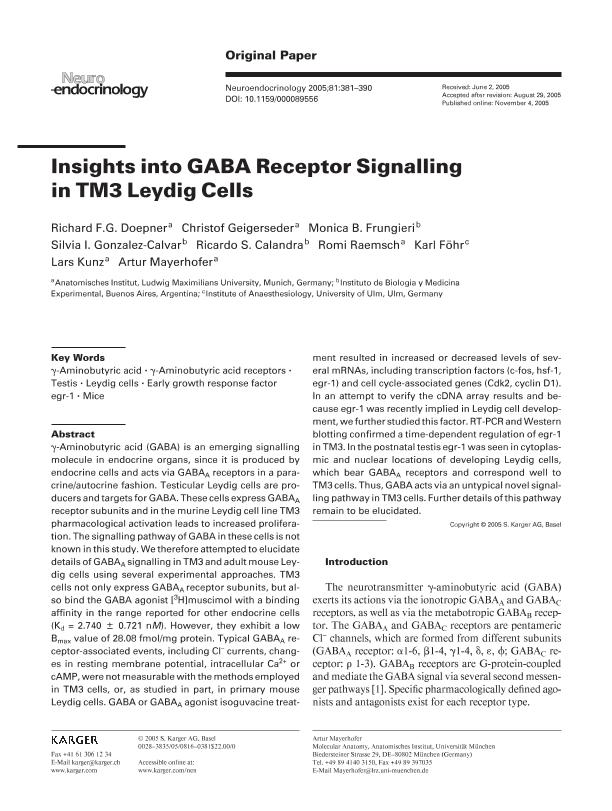Mostrar el registro sencillo del ítem
dc.contributor.author
Doepne, R. F. G,
dc.contributor.author
Geigerseder, C.
dc.contributor.author
Frungieri, Monica Beatriz

dc.contributor.author
Gonzalez Calvar, Silvia I.

dc.contributor.author
Calandra, Ricardo Saul

dc.contributor.author
Raemsch, R.
dc.contributor.author
Fohr K,
dc.contributor.author
Kunz, L.
dc.contributor.author
Mayerhofer, A.
dc.date.available
2017-12-22T05:26:04Z
dc.date.issued
2005-12
dc.identifier.citation
Mayerhofer, A.; Kunz, L.; Fohr K,; Raemsch, R.; Calandra, Ricardo Saul; Gonzalez Calvar, Silvia I.; et al.; Insights into GABA receptor signalling in TM3 Leydig cells; Karger; Neuroendocrinology; 81; 6; 12-2005; 381-390
dc.identifier.issn
0028-3835
dc.identifier.uri
http://hdl.handle.net/11336/31342
dc.description.abstract
Gamma-aminobutyric acid (GABA) is an emerging signalling molecule in endocrine organs, since it is produced by endocrine cells and acts via GABA(A) receptors in a paracrine/autocrine fashion. Testicular Leydig cells are producers and targets for GABA. These cells express GABA(A) receptor subunits and in the murine Leydig cell line TM3 pharmacological activation leads to increased proliferation. The signalling pathway of GABA in these cells is not known in this study. We therefore attempted to elucidate details of GABA(A) signalling in TM3 and adult mouse Leydig cells using several experimental approaches. TM3 cells not only express GABA(A )receptor subunits, but also bind the GABA agonist [(3)H]muscimol with a binding affinity in the range reported for other endocrine cells (K(d) = 2.740 +/- 0.721 nM). However, they exhibit a low B(max) value of 28.08 fmol/mg protein. Typical GABA(A) receptor-associated events, including Cl(-) currents, changes in resting membrane potential, intracellular Ca(2+) or cAMP, were not measurable with the methods employed in TM3 cells, or, as studied in part, in primary mouse Leydig cells. GABA or GABA(A) agonist isoguvacine treatment resulted in increased or decreased levels of several mRNAs, including transcription factors (c-fos, hsf-1, egr-1) and cell cycle-associated genes (Cdk2, cyclin D1). In an attempt to verify the cDNA array results and because egr-1 was recently implied in Leydig cell development, we further studied this factor. RT-PCR and Western blotting confirmed a time-dependent regulation of egr-1 in TM3. In the postnatal testis egr-1 was seen in cytoplasmic and nuclear locations of developing Leydig cells, which bear GABA(A) receptors and correspond well to TM3 cells. Thus, GABA acts via an atypical novel signalling pathway in TM3 cells. Further details of this pathway remain to be elucidated.
dc.format
application/pdf
dc.language.iso
eng
dc.publisher
Karger

dc.rights
info:eu-repo/semantics/openAccess
dc.rights.uri
https://creativecommons.org/licenses/by-nc-sa/2.5/ar/
dc.subject
Leydig Cells
dc.subject
Testis
dc.subject
Aminobutyric Acid
dc.subject.classification
Neurociencias

dc.subject.classification
Medicina Básica

dc.subject.classification
CIENCIAS MÉDICAS Y DE LA SALUD

dc.title
Insights into GABA receptor signalling in TM3 Leydig cells
dc.type
info:eu-repo/semantics/article
dc.type
info:ar-repo/semantics/artículo
dc.type
info:eu-repo/semantics/publishedVersion
dc.date.updated
2017-12-19T18:36:38Z
dc.identifier.eissn
1423-0194
dc.journal.volume
81
dc.journal.number
6
dc.journal.pagination
381-390
dc.journal.pais
Suiza

dc.journal.ciudad
Basel, Suiza
dc.description.fil
Fil: Doepne, R. F. G,. Ludwig Maximilians Universitat; Alemania
dc.description.fil
Fil: Geigerseder, C.. Ludwig Maximilians Universitat; Alemania
dc.description.fil
Fil: Frungieri, Monica Beatriz. Consejo Nacional de Investigaciones Científicas y Técnicas. Instituto de Biología y Medicina Experimental. Fundación de Instituto de Biología y Medicina Experimental. Instituto de Biología y Medicina Experimental; Argentina
dc.description.fil
Fil: Gonzalez Calvar, Silvia I.. Consejo Nacional de Investigaciones Científicas y Técnicas. Instituto de Biología y Medicina Experimental. Fundación de Instituto de Biología y Medicina Experimental. Instituto de Biología y Medicina Experimental; Argentina
dc.description.fil
Fil: Calandra, Ricardo Saul. Consejo Nacional de Investigaciones Científicas y Técnicas. Instituto de Biología y Medicina Experimental. Fundación de Instituto de Biología y Medicina Experimental. Instituto de Biología y Medicina Experimental; Argentina
dc.description.fil
Fil: Raemsch, R.. Ludwig Maximilians Universitat; Alemania
dc.description.fil
Fil: Fohr K,. Universitat Ulm; Alemania
dc.description.fil
Fil: Kunz, L.. Ludwig Maximilians Universitat; Alemania
dc.description.fil
Fil: Mayerhofer, A.. Ludwig Maximilians Universitat; Alemania
dc.journal.title
Neuroendocrinology

dc.relation.alternativeid
info:eu-repo/semantics/altIdentifier/url/https://www.karger.com/Article/Abstract/89556
dc.relation.alternativeid
info:eu-repo/semantics/altIdentifier/doi/http://dx.doi.org/10.1159/000089556
dc.relation.alternativeid
info:eu-repo/semantics/altIdentifier/pmid/https://www.ncbi.nlm.nih.gov/pubmed/16276116
Archivos asociados
